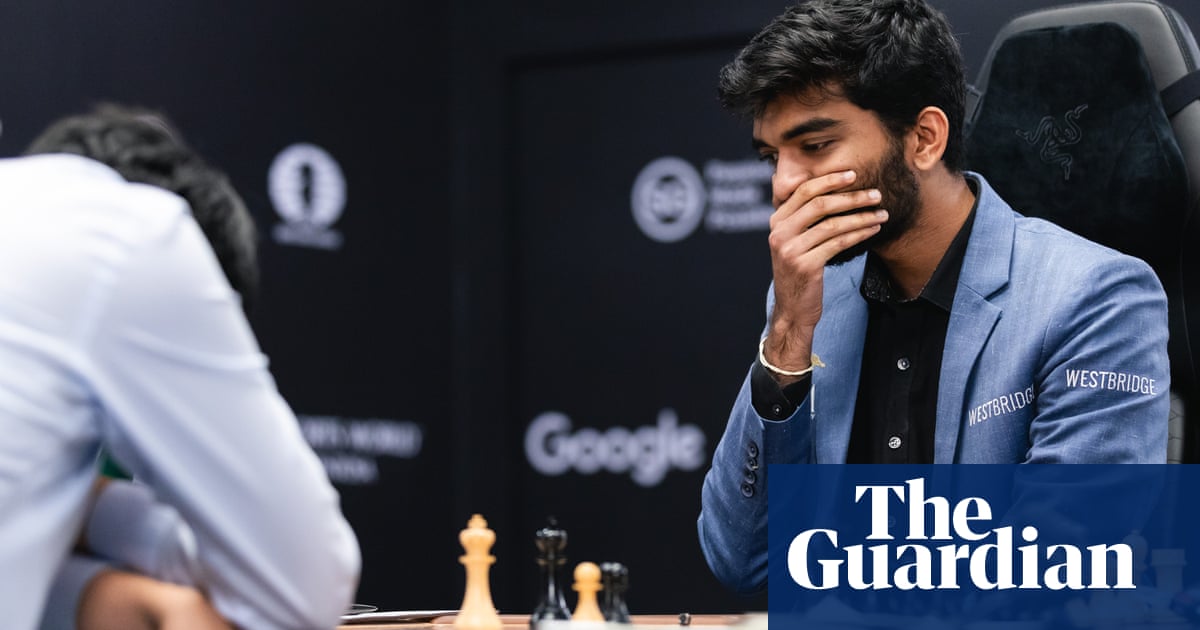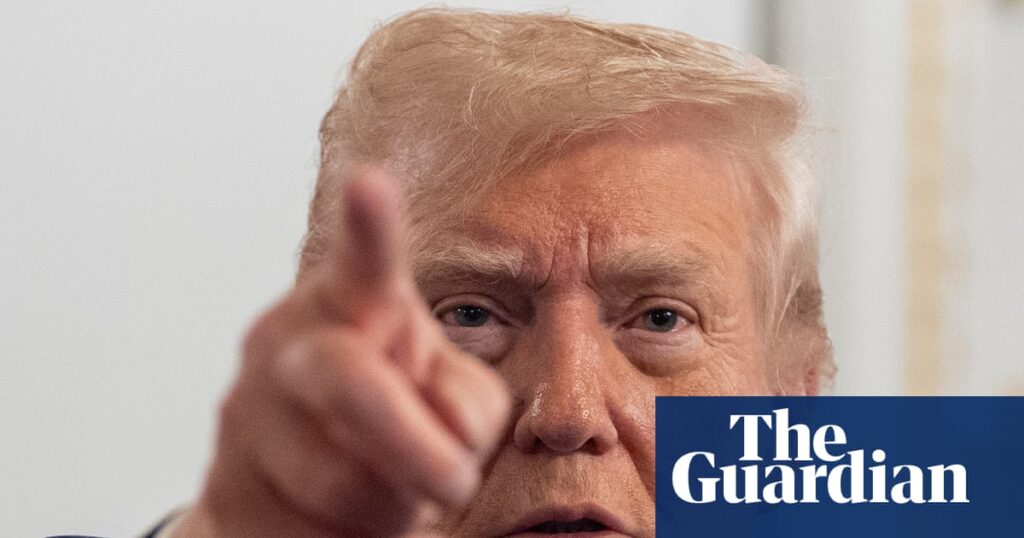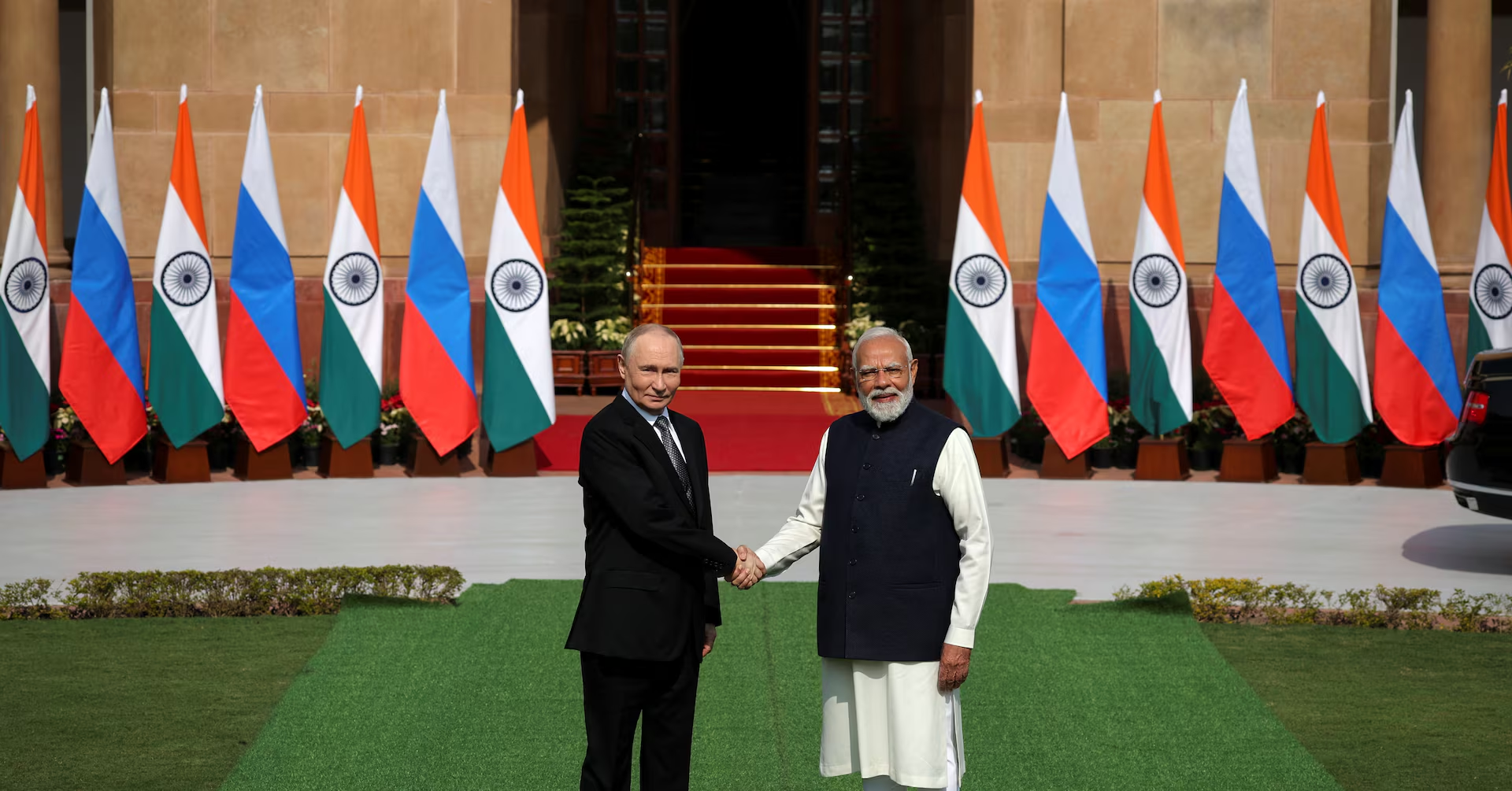Now Reading: Gukesh Dommaraju becomes youngest world chess champion after horrific Ding Liren blunder | World Chess Championship 2024
-
01
Gukesh Dommaraju becomes youngest world chess champion after horrific Ding Liren blunder | World Chess Championship 2024
Gukesh Dommaraju becomes youngest world chess champion after horrific Ding Liren blunder | World Chess Championship 2024

” frameBorder=”0″ class=”dcr-ivsjvk”>
Indian teenager Gukesh Dommaraju capped a stunning ascent to the pinnacle of chess by dethroning China’s Ding Liren to become the youngest ever world chess champion on Thursday in Singapore.
The 18-year-old from Chennai dramatically snatched the decisive victory from a dead-drawn position in the final contest of their best-of-14-games showdown when Ding made one of the worst blunders in the 138-year history of world championship matchplay. The 32-year-old defending champion resigned moments later after a game that lasted 58 moves and just over four hours, sealing Gukesh’s 7½-6½ win in the three-week match and rendering moot the widely expected prospect of tiebreaker matches on Friday afternoon.
In doing so, Gukesh shattered the age record held by Garry Kasparov, who was 22 when he toppled Anatoly Karpov in 1985.
Quick Guide
World Chess Championship 2024
Show
• Read our complete World Chess Championship watch guide
The players
China’s Ding Liren is defending the world chess championship against fast-rising Indian teenager Gukesh Dommaraju. The best-of-14-games match is scheduled to take place from 23 November to 15 December at Resorts World Sentosa in Singapore for an overall prize fund of $2.5m (£1.98m).
Ding became China’s first men’s world chess champion by defeating Ian Nepomniachtchi last year in Kazakhstan, winning the title vacated by longtime world No 1 Magnus Carlsen of Norway. But the 32-year-old from Zhejiang province has played only 44 classical games in the 19 months since winning the world title while battling personal difficulties including depression and will go off as an underdog in his first world title defense.
Gukesh, commonly known as Gukesh D, stunned the chess establishment by winning the eight-man Candidates tournament in Toronto aged 17 to become the youngest ever challenger for the world championship, finishing top of a stacked field that included Nepomniachtchi, Hikaru Nakamura and Fabiano Caruana. The 18-year-old can shatter the record for youngest ever world champion held by Garry Kasparov, who was 22 when he dethroned Karpov in their 1985 rematch in Moscow.
The format
The match will consist of 14 classical games with each player awarded one point for a win and a half-point for a draw. Whoever reaches seven and a half points first will be declared the champion.
The time control for each game in the classical portion is 120 minutes per side for the first 40 moves, then 30 minutes for the rest of the game, with a 30-second increment per move starting with move 41.
If the score is equal after 14 games, tiebreak games with faster time controls will be played:
• A match consisting of four rapid games with 15 minutes per side and a 10-second increment starting with move 1 would be played. If a player scores 2½ points or more, he would win the championship.
• If the score is still equal, a mini-match of two rapid games would be played, with 10 minutes per side and a five-second increment starting with move 1. If a player scored 1½ points or more, he would win the championship.
• If the score is equal after the rapid portion, a mini-match of two blitz games would be played, with a time control of three minutes per side and a two-second increment starting with move 1. If a player scored 1½ points or more, he would win the championship. A drawing of lots would take place before each mini-match to decide which player plays with the white pieces.
• If the blitz mini-match are tied, a single blitz game with a time control of three minutes per side and a two-second increment starting with move 1 would be played, and the winner would win the championship. A drawing of lots would decide which player plays with the white pieces. If this game was drawn, another blitz game with reversed colors would be played with the same time control, and the winner would win the championship. This process is repeated until either player wins a game.
Players are not allowed to agree to a draw before black’s 40th move. A draw claim before then is only permitted if a threefold repetition or stalemate has occurred.
The schedule
Sat 23 Nov Opening ceremony and technical meeting
Sun 24 Nov Rest day
Mon 25 Nov Game 1 (Gukesh–Ding, 0-1)
Tue 26 Nov Game 2 (Ding-Gukesh, ½-½)
Wed 27 Nov Game 3 (Gukesh-Ding, 1-0)
Thu 28 Nov Rest day
Fri 29 Nov Game 4 (Ding-Gukesh, ½-½)
Sat 30 Nov Game 5 (Gukesh-Ding, ½-½)
Sun 1 Dec Game 6 (Ding-Gukesh, ½-½)
Mon 2 Dec Rest day
Tue 3 Dec Game 7 (Gukesh-Ding, ½-½)
Wed 4 Dec Game 8 (Ding-Gukesh, ½-½)
Thu 5 Dec Game 9 (Gukesh-Ding, ½-½)
Fri 6 Dec Rest day
Sat 7 Dec Game 10 (Ding-Gukesh, ½-½)
Sun 8 Dec Game 11 (Gukesh-Ding, 1-0)
Mon 9 Dec Game 12 (Ding-Gukesh, 1-0)
Tue 10 Dec Rest Day
Wed 11 Dec Game 13 (Gukesh-Ding, ½-½)
Thu 12 Dec Game 14 (Ding-Gukesh, 0-1)
Fri 13 Dec Tiebreaks (if necessary)
Sat 14 Dec Closing ceremony
All games start at 5pm local time, 2.30pm in India, 9am in London, 4am in New York.
Gukesh admitted he didn’t initially recognize Ding’s rook move (55 Rf2??) as a blunder, saying it took a few seconds to spot that his opponent’s bishop was trapped. He could barely conceal his excitement upon the discovery, while a devastated Ding could only bury his head in his hands.
“When I realized it, it was probably the best moment of my life,” said Gukesh, who brings home the $1.35m (£1.06m) winner’s share of the $2.5m prize fund along with the sport’s most prestigious title.
Allow content provided by a third party?
This article includes content hosted on embed.bsky.app. We ask for your permission before anything is loaded, as the provider may be using cookies and other technologies. To view this content, click ‘Allow and continue’.
Ding, playing with the favored white pieces, was slightly better out of the opening but Gukesh was able to unlock his pieces and stabilize in the middlegame. The draw appeared inevitable when material starting coming off the board in bunches starting with move 19.
But a game that appeared bound for a peaceful result suddenly became complicated when Ding sacrificed a pawn in exchange for a simpler position. That left Gukesh with no choice but to fight on and he was more than happy to punish his foe in a grueling endgame under mounting time pressure.
That’s when Ding finally cracked.
“I was totally in shock when I realized I made a blunder,” Ding said. “His facial expression showed that he was very happy and excited and I realized I made a blunder. It took some time to realize it.”
Allow content provided by a third party?
This article includes content hosted on lichess.org. We ask for your permission before anything is loaded, as the provider may be using cookies and other technologies. To view this content, click ‘Allow and continue’.
Indian prime minister Narendra Modi was among the first to congratulate Gukesh after he became only the second world champion from India along with Viswanathan Anand, who held the crown from 2007 through 2013.
“Historic and exemplary!” Modi wrote on X. “Congratulations to Gukesh D on his remarkable accomplishment. This is the result of his unparalleled talent, hard work and unwavering determination.”
After Ding resigned, the tears flowed as Gukesh sat the board overcome by emotion while hundreds of his supporters set off scenes of jubilation in the spectators’ area.
“I probably got so emotional because I did not really expect to win from that position,” Gukesh said. “I was going to press it for as long as it as I could possibly press, but I thought, ‘It’s OK. We are going to play for five, six hours. It’s going to end in a draw, and let’s focus on the tiebreaks.’
“But then suddenly after Rf2, I saw [the game] was actually done. I was already preparing myself to go through that huge tiebreak fight and suddenly it was all over and I had achieved my dream. I’m not someone who shows a lot of emotions, but I think this one can be forgiven.”
Last year Ding became the first men’s world chess champion from China by defeating Russia’s Ian Nepomniachtchi in Kazakhstan, capturing the title abdicated by longtime world No 1 Magnus Carlsen of Norway. But he’d played very sparingly in the 19 months since then amid a well-documented bout with depression, including a nine-month hiatus to prioritize his mental health.
He entered the title match having gone 28 classical games without a win, a dreadful run of form that saw him drop to 23rd in the world rankings and prompted the oddsmakers to install him as roughly a 3-1 longshot in the match. But he sprang a major surprise in Game 1 by winning as black, ending the 304-day winless streak with a riveting opening salvo.
Game 2 was a quiet draw, before Gukesh roared back with a win in Game 3. The fourth, fifth, sixth, seventh, eighth, ninth and 10th games were each draws. Gukesh won on Sunday in Game 11 before Ding struck back in Monday’s Game 12. The 13th game on Wednesday saw Ding hold on in a high-wire draw, leaving the score at 6½-all entering Thursday’s finale at Resorts World Sentosa, an island resort off Singapore’s southern coast.
While Ding had been regarded as the underdog in the match due to his unremarkable form, he would have gone off as a slight favorite if Game 14 was drawn and the match was settled on Friday with a series of tiebreak games with faster time controls.
“Champions always step up to the moment,” the fifth-ranked Gukesh said. “Obviously the past two years he hasn’t been in great shape, but he came here. He was obviously struggling during some of games. He was probably not at his best physically. But he fought in all games. He fought like a true champion.”
Gukesh, commonly known as Gukesh D, became the third-youngest grandmaster in history at 12 years and seven months. In April, at 17, he stunned the chess establishment by winning the eight-man Candidates tournament in Toronto to become the youngest ever challenger for the world championship, finishing top of a stacked field that included Nepomniachtchi, Hikaru Nakamura and Fabiano Caruana.
That Gukesh was even playing for the world title was a historic achievement. Until April, teenagers had had an indifferent record in the Candidates over the years. Only Bobby Fischer in 1959 and Carlsen in 2006, both then 16, were younger than Gukesh, and both were also-rans.
“My journey, it’s been since the time I started playing chess at six and a half, seven [years old],” Gukesh said. “I’ve been dreaming about this moment for more than 10 years. Every chess player wants to experience this moment and very few get the chance. To be one of them is … I think the only way to explain it is I am living my dream.”



















